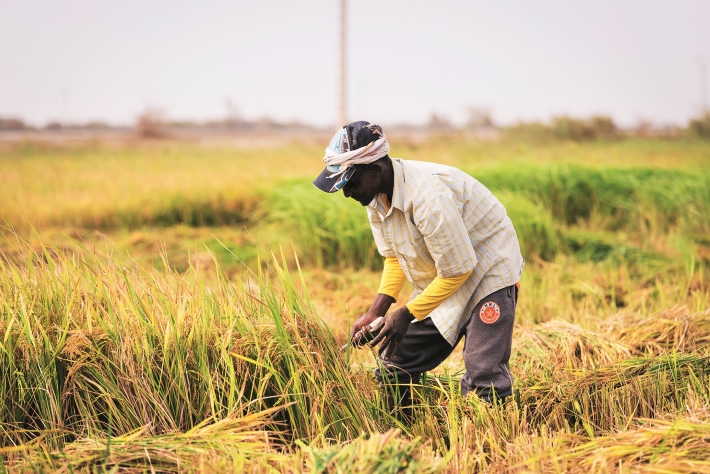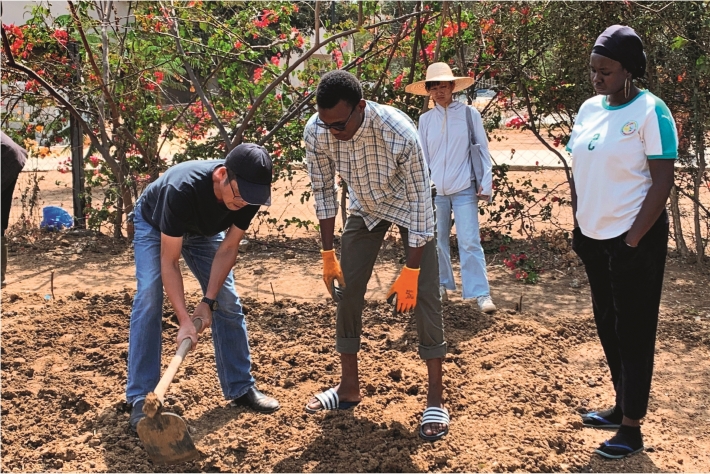
A farmer in a rice field in Saint Louis, Senegal, in June 2019 (CTA)
In the heart of the Senegal River Valley lies the story of Cheikh Ndiaye, a seasoned farmer whose life has become intertwined with the recent wave of agricultural innovation brought by Chinese agricultural experts.
Over the past decade, the introduction of new agricultural practices and crops by these experts has transformed local agriculture, fostering a unique economic and cultural exchange between Senegal and China.
Ndiaye, like many of his fellow Senegalese farmers, has witnessed firsthand the impact of this cross-cultural collaboration. The once familiar fields of millet and peanuts have expanded to include rice, wheat, and hybrid crops introduced by the Chinese.
This blend of traditional and modern agricultural techniques has not only increased productivity, but also enhanced food security and economic stability for the local communities.
The narrative of Ndiaye and his peers is one of adaptation and mutual benefit.
“I have gained a lot of expertise on how I cultivate crops. Farming is an art and one has to have great passion for it. On my 10 acres (4.05 hectares), I have a high crop yield. Irrigation also adds to better output,” said Ndiaye.
Chinese agronomists have conducted workshops in partnership with local agricultural societies, teaching farmers how to use high-yield rice and millet seeds. These seeds are distributed through a network of farmer cooperatives and government agencies, ensuring broad access across the region. Ndiaye reported that since adopting these new seeds and techniques, his rice yields have doubled, allowing him to sell surplus produce at the local market.
In addition, local agricultural societies are also playing similar roles, while banks have come on board by giving loans to farmers.
Ndiaye makes great use of the Senegal River Basin irrigation projects that have been developed to support farming and improve food security, knowing that irrigation is crucial to his increase in crop yield.
Irrigation Initiatives
One of the significant initiatives is the construction of dams and irrigation canals, such as Diama and Manantali dams, which help to regulate water flow and provide a reliable water supply for irrigated agriculture in the river basin, benefitting countries like Senegal, Mauritania, Guinea and Mali.
“These projects have facilitated the cultivation of crops such as rice, maize, and vegetables, thereby enhancing agricultural productivity and livelihoods in the region. The Senegal River is approximately 1,640 km long. Its drainage basin covers an area of about 270,000 square km,” said Mabouba Diagne, the country’s minister of agriculture, food sovereignty, and livestock.
The Senegal River flows into the Atlantic Ocean near the city of Saint Louis in Senegal. From Dakar, the country’s capital, the distance to Saint-Louis is approximately 320 km by road.
“The Chinese agronomists bring expertise and train our local farmers on agricultural sustainability. They represent organisations such as China National Hybrid Rice Research and Development Centre. Other companies like China Machinery Engineering Corp. and China CAMC Engineering Co. Ltd. have also worked alongside Senegalese farmers.
“They have worked to improve irrigation systems, mechanise farming practices, and introduce high-yield crop varieties. This cooperation has significantly boosted agricultural output and introduced sustainable farming practices that benefit the environment and local economy,” said Diagne.
Chinese Ambassador to Senegal Xiao Han said in the Saint-Louis region of Senegal, Chinese agricultural experts have worked closely with local cooperatives to implement a new irrigation system that allows farmers to cultivate rice throughout the year.
“Before this intervention, farming in the area was largely dependent on the seasonal flow of the Senegal River, limiting crop cycles and yields. With the new irrigation canals and pumps introduced by Chinese engineers, farmers can now grow multiple crops, significantly increasing their income,” said Xiao.
Meanwhile, during an organised trip in April for diplomats from over 20 African countries to a food technology company in China, African diplomats discussed how to promote agricultural cooperation between Chinese and African enterprises.
“When you talk about the Forum on China-Africa Cooperation, the mechanism for the cooperation between China and Africa, one of the most important topics is agricultural cooperation between China and Africa,” said Ibrahima Sory Sylla, Senegalese ambassador to China.

A Chinese agricultural expert instructs students at the Confucius Institute at Cheikh Anta Diop University of Dakar in Senegal on 22 February 2023 (XINHUA)
Chinese Market
According to Diagne, local markets in Senegal, now feature a diverse array of crops, catering to the evolving tastes and demands of the communities. The Chinese involvement extends beyond mere agricultural productivity; it has fostered an environment of learning and cultural exchange, where Senegalese farmers like Ndiaye learn new techniques while sharing their rich agricultural heritage.
Rice is now being grown in the Casamance Region and Anambé Basin. Situated in the Kolda region, the basin is another significant area for irrigated rice production.
“Wheat is less commonly grown in Senegal compared to rice and millet, but it is cultivated in some regions. In the Senegal River Valley, besides rice, it is used for wheat cultivation, mainly through irrigated farming systems,” said Diagne.
He explains that in the Tambacounda Region, there are efforts to promote wheat cultivation as part of diversification and food security strategies.
Irrigation plays a key role in rice and wheat farming. The China-Africa Development Fund supports various agricultural and infrastructure projects in Senegal and other African countries, often in partnership with Chinese companies like ZTE Agribusiness, a subsidiary of the telecommunications giant ZTE, which has been involved in agricultural projects in Africa.
Future prospects for agricultural initiatives in Senegal are looking good, according to Xiao.
“We will for sure bring more Chinese agronomists [to Senegal] in future to showcase their expertise by training local farmers and improve local productivity,” said Xiao.
Xiao said that Chinese agronomists are not only growing crops, but also training local farmers and providing agricultural extension services such as pest control.
China wants to target a five-year plan of $5 billion investment into Senegal, according to Xiao.
“It sounds very ambitious but it is doable. Senegal should be food secure amidst many challenges like climate change,” he said.
(Original Title: Sustainable Farming Here and Now)
Category
China's Modern Irrigation Systems and Hybrid Crop Techniques Supported Senegal's Agricultural Transformation
Contributor
China's Modern Irrigation Systems and Hybrid Crop Techniques Supported Senegal's Agricultural Transformation
Country
Story

